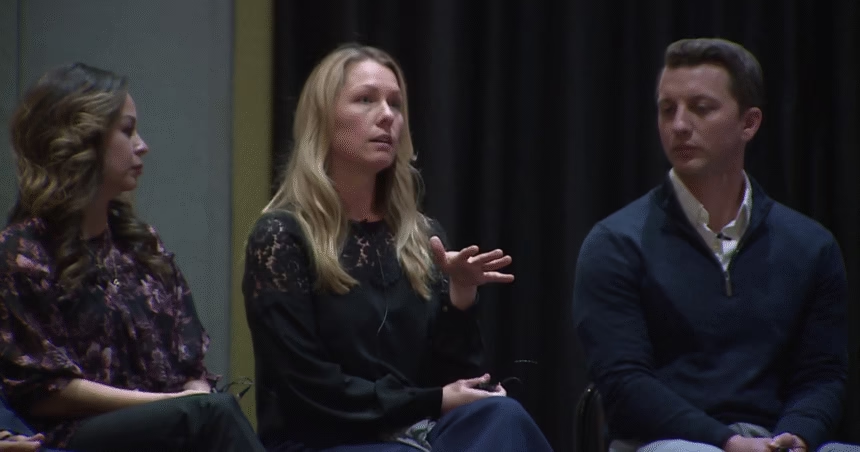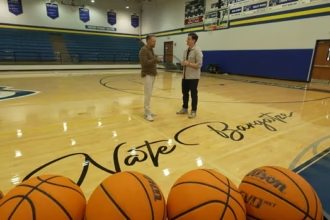Never-before-released interrogations of Matthew Muller, the serial predator who kidnapped Denise Huskins in 2015, show his confessions to decades of other home invasions and sexual assaults.
These revelations might never have come to light without Huskins and her husband, Aaron Quinn, the couple once falsely accused of staging a hoax. Now, they’re being honored as “Witnesses of the Year” by the California District Attorneys Association for their persistence in helping investigators uncover the truth.
The cold-case confessions were recorded in Arizona last November during in-custody interviews, stemming from the couple’s pursuit of justice for additional victims.
Muller admitted to a series of crimes, including one that dates back 30 years and another that was so terrifying, the victims never reported it.
“The first one was Mountain View. … the next one was in Palo Alto, where I’d had actual police contact,” Muller said in the recorded confessions.
At a May law enforcement conference in South Lake Tahoe, the city where she was once held captive, Huskins was no longer a name on a case file. She was an expert.
“The disbelief of victims and the survivors is actually something quite common, too common,” she said at a science-based interviewing (SBI) panel at the conference. “This is a serious problem that goes way beyond us in our case.”
Huskins and Quinn were alongside the two officers who were the first to believe their story: Alameda County Sheriff’s Lieutenant Misty Carausu and Seaside Police Chief Nick Borges.
Together, this team helped solve at least four cold cases this year by obtaining these new confessions to crimes that may have been solved a decade ago if only someone had listened sooner.
The “American Nightmare”
In March 2015, Muller invaded the couple’s Vallejo home, blindfolding and drugging them. He kidnapped, raped and held Huskins for ransom at a cabin in South Lake Tahoe.
Huskins was missing for two days, and during that time, investigators accused Quinn of killing her. Then, once Muller released Huskins, instead of searching for the kidnapper, police accused the couple of orchestrating a hoax.
“Now, we know there are two other families that Muller terrorized and attacked because these agents, these investigators had blinders on,” Quinn said in an exclusive interview with CBS News California in January 2025.
Two months after the Vallejo incident, a similar attack happened in nearby Dublin, California, leading police to Muller’s Tahoe cabin, where he’d held Huskins captive and where Carausu, a then-rookie detective, found the crucial evidence that proved the couple told the truth.
“I was, like, ‘Oh my God.’ She has long blonde hair and I have goggles with… literally, it was one strand of blonde hair,” Carausu recounted for officers at a recent law enforcement panel.
Huskins and Quinn were vindicated. Muller was sentenced to 40 years in federal prison, but the nightmare wasn’t over.
Interrogation footage from 2015 reveals that Huskins warned police a decade ago that Muller told her there were other victims.
“It’s terrifying to me to think of how many victims there might still be out there that are living in fear and wondering if they’re going to be attacked again,” Huskins told CBS News California in January.
The Reckoning
Then, Borges saw last year’s most-watched Netflix docuseries, chronicling the first chapter of Huskins and Quinn’s “American Nightmare.”
“I just wanted them to know that I always believed them,” Borges explained.
Borges reached out to the couple on Instagram and organized a law enforcement speaking engagement for them and Carausu. What began as a conversation soon became a mission when the couple told Borges that they suspected more victims.
“[Huskins] said, ‘We’re not law enforcement. What do we do?’ ” Borges told CBS News California in January 2025. Borges noted that he then wrote a letter to the U.S. Attorney’s Office “and never heard back.”
So, working with Huskins, Quinn and Caurasu, Borges wrote directly to an imprisoned Muller. Borges said Muller wrote back, confessing on paper to additional crimes.
Muller first confessed to two 2009 Santa Clara County home invasions and attempted rapes. Police questioned Muller at the time, but said they didn’t have enough evidence to charge him.
Despite similarities to Huskins’ case years later, investigators didn’t reopen those cases or retest Muller’s DNA.
“It’s fair to say there are things that we would do differently and do better today than we did then. … That’s because of the Quinns,” Santa Clara County District Attorney Jeff Rosen told CBS News California.
This year, Rosen reopened the cases and tested Muller’s DNA, which he acknowledged was justice delayed for the victims, and for Huskins and Quinn.
“I’m sorry. And thank you… Because you didn’t give up, other victims have been saved,” Rosen said to Huskins and Quinn during a recent CBS California Interview.
Muller was sentenced to two life terms for the two Santa Clara County cases earlier this year.
“It came the week of the 10-year anniversary of our kidnapping,” Huskins said at the SBI panel. “So it was very like, wow, like, just looking back at everything that it took to get to this place.”
Muller also confessed to an unreported 2015 home invasion robbery in Contra Costa, which happened just two weeks after he released Huskins and months before he was ultimately arrested for another home invasion in Vallejo.
But in order to bring closure to those victims, detectives would have to find them. So Chief Borges enlisted El Dorado County District Attorney Vern Pierson, who had jurisdiction because Huskins was held in Tahoe. Along with an FBI agent, Pierson interviewed Muller in prison.
In the recorded confessions, Muller described how he convinced the family to keep the crime a secret, threatening that his accomplices would find and harm their kids.
“So there’s very good reason, if they didn’t report it,” Muller said.
Muller drew a map for investigators to help identify the location of the home, but they say the key to solving the unreported Contra Costa County crime was a ladder that Muller said he used to gain entry into the victims’ home.
“I threw it into the ravine that was pretty much directly behind the property,” Muller said.
Pierson had a hunch: “What if that ladder is still there?” Nearly a decade later, it was.
Pierson credits Contra Costa detectives for hiking into the woods at night based on a hunch from a rural county district attorney they had never met.
“About two hours later, I get a text of a picture of this ladder from a crime that had never been reported that took place nine years earlier, Pierson said.
They found the house and the victims, still living in fear.
“We had no knowledge that they had suffered this horrible crime,” Contra Costa District Attorney Dina Becton told CBS News California.
Becton stressed that this was not a cold case and said it wouldn’t have even been investigated without Huskins, Quinn and the officers who finally believed them.
“After all of these years of never giving up hope that they could bring justice for themselves but for others, it’s just remarkable,” Becton said.
Muller would eventually get another life sentence for the Contra Costa crime, but his confessions didn’t end there.
“One of the most striking things is finding out how young he was when he started. Age 16, attacking a couple,” Huskins said.
Muller described how he ambushed a couple camping in Sacramento County in 1993.
“I ordered them out of the tent, and I think I verbally told them I had a gun,” Muller said. “I believe I tied them both. I put the male back in the tent.”
At the time, police didn’t believe the victims. Instead, like with Huskins and Quinn, investigators questioned the boyfriend.
“Through Denise’s and Aaron’s persistence, we were able to find other victims who, for the last 30 years, felt as if justice did not belong to them,” Sacramento County District Attorney Thien Ho said in June.
Last month, Ho secured another life sentence for Muller for the 1993 crime.
“Denise and Aaron, we owe you a debt of gratitude,” Ho said. “Without your courage, these victims would have never obtained justice.”
Full Circle
Six crimes. More than a dozen victims. Thirty-two years of unanswered questions and justice delayed. These are cases that could have been solved sooner, with victims who could have been spared.
But thanks to Denise and Aaron Quinn, they were not forgotten.
“I think in the bigger picture, part of it is how things can change and shift and how investigations are handled and how victims are treated and valued and respected and our role in the process,” Huskins said.
Huskins and Quinn are now helping to train law enforcement officials on how to work better with victims to help solve crimes. The couple is also working with law enforcement to sponsor legislation that they hope will address some of the failings in their case. For instance, no one even tested Huskins’ rape kit until this year.
Denise and Aaron Quinn were honored by the California District Attorneys Association as “Witnesses of the Year” on Thursday. It’s an honor not just for what they endured but for what they’ve made possible.









